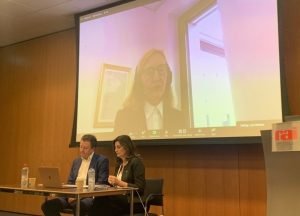International Road Federation workshop for effective road asset management
Growing population, urbanization, climate change and energy transition will be key drivers of change in transport in the next 10-15 years. Steve Philips, Secretary-General of our partner platform CEDR (Conference of European Directors of Roads), attended the “Novel Practices for Effective Road Assets Management” Workshop, organised by IRF – International Road Federation, that took place on 31 March 2022, in Amsterdam and online.
Together with the European Investment Bank (EIB), Steve Phillips opened the session of the International Road Federation. The EIB explained its role as a climate bank supporting the development of resilient infrastructure and Steve focussed on the link between sustainability and resilience. By being guided by the UN’s Sustainable Development Goals, a resilient transport system needs resilient physical infrastructure, resilient digital infrastructure, and perhaps most importantly resilient organisational infrastructure. This requires both the trusted and ethical institutional strength as well as bandwidth for those organisations to address the growing range of issues.
Steve also highlighted the need for the transport infrastructure to be better developed alongside the energy and telecom infrastructure. This is a core message for the third theme of the TRA Conference. TRA2022 aims to bring together the multi-sectoral stakeholders and invited all delegates to join the debate in Lisbon in November.
The IRF workshop aimed to strengthen efficiency, climate-proofing, resilience, and prevention and preparedness of the European road assets, which is critical for the resilience of the entire society facing various external challenges ranging from climate change to pandemics. Therefore, the event focused on the following questions: What strategies would best help meet those challenges? How do we set priorities and how do we pay for the adaptation efforts needed? What innovative practices can help this transition?























